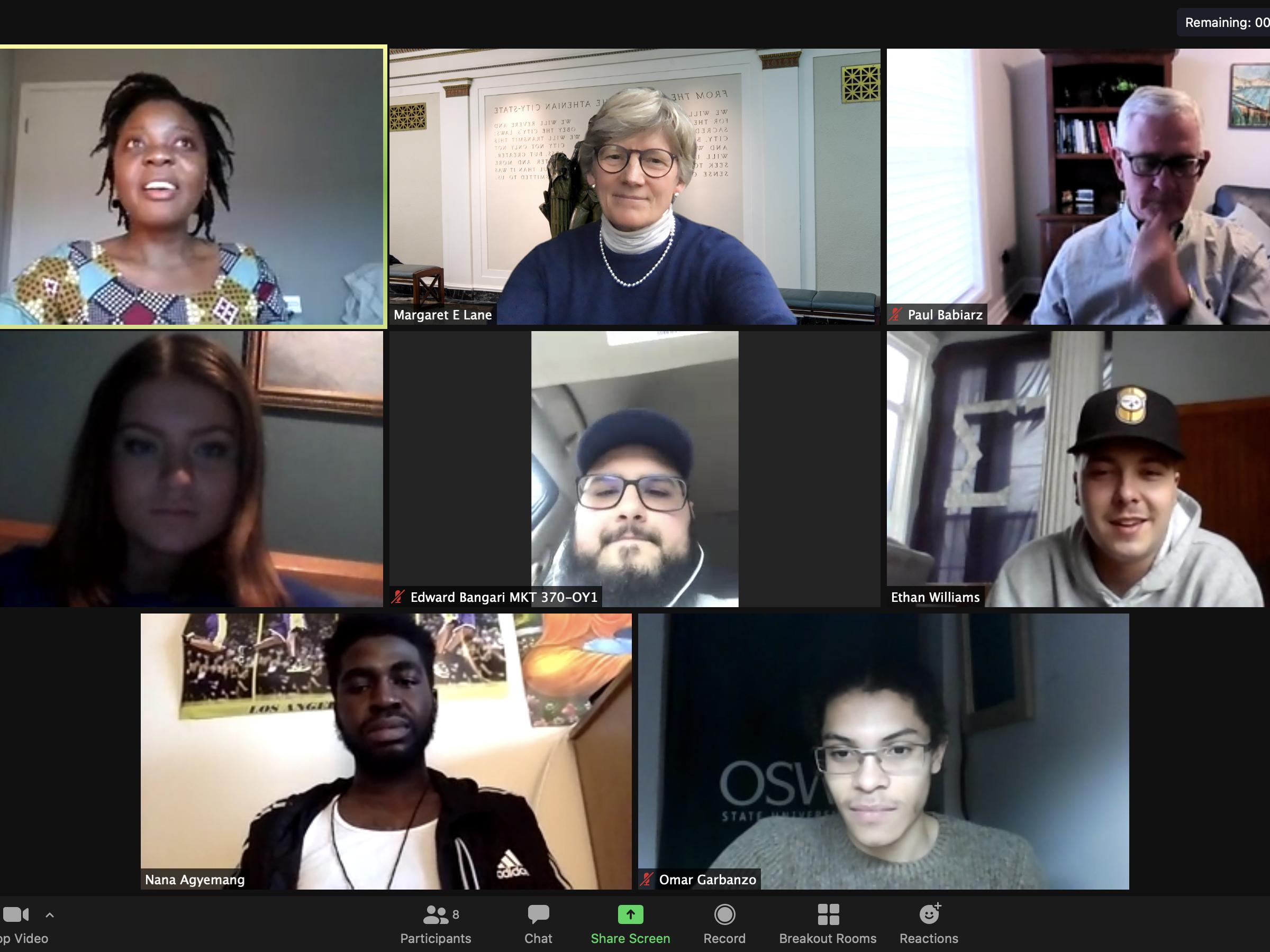Around 30 SUNY Oswego students recently had a unique opportunity to interact with five young professionals from countries not usually on the college visitors' list.
This March 31 opportunity came about thanks to the annual Speed Meeting event that SUNY Oswego’s Institute for Global Engagement (IGE) organizes in collaboration with the Humphrey Fellowship Program at the Maxwell School of Citizenship and Public Affairs at Syracuse University.
A Speed Meeting (similar to speed dating, but for professional purposes) is an opportunity to sit down and have quick chats with lots of people in a short period of time. While the event traditionally takes place in a face-to-face format, this year students, faculty and staff were able to interact via Zoom with five Humphrey Fellows from all over the world: Doreen Bangapi Mwanyama from Tanzania, Jordan Dean from Papua New Guinea, Jovana Bulatovic from Montenegro, Julio Herrera Toledo from Guatemala and Ramiro Suárez Galán from Mexico.
Students responded well to the format. “I really appreciated the proximity we had with the Fellows and the incredible opportunity to meet people,” said student Jade Bechhoefer.
The Humphrey Fellows agreed. “We all loved talking to young, bright students,” said Jordana Bulatovic from Montenegro.
The Humphrey Fellowship program was initiated in 1978 to honor Vice President Hubert H. Humphrey and his life-long commitment to international cooperation and public service. The Fellows who virtually visited Oswego are part of a cohort of more than 125 professionals from 81 countries visiting the U.S. this year. Syracuse University is one of 12 campuses across the country to host fellows as they participate in graduate study, professional development and cultural exchange. SUNY Oswego’s IGE is a community partner in the program.
“I liked being able to talk to people from countries that I normally wouldn't be able to talk to,” said SUNY Oswego student Samantha Schwartz.
Another Oswego student, Jordan Meeker, agreed. “We are used to hearing from countries in Europe but we do not see much from smaller countries in other parts of the world.” She added that the conversations broached many interesting topics. “Learning about business relations and COVID-19 responses in smaller countries was quite interesting.”
Bulatovic also appreciated the scope of the conversations, and the opportunity to talk about her homeland in detail, despite the rapid format of the interviews: “I was very happy to hear that students were interested in topics that are quite relevant for today's Montenegro: creating a national identity, main political constraints, how did we manage to become the first COVID-free country, main ethical dilemmas in business and public administration...”
The event, Bulatovic added, also served to enhance intercultural understanding around issues like gender equality: “Through discussion, we also agreed that no matter how big the differences are between the USA and Montenegro, we share some concerns regarding gender equality — we both need more women in positions of decision-making and we need to work on reducing the gender pay gap.”
The opportunity to engage in this kind of comparative analysis was enriching, as student Omar Garbanzo remarked when reflecting on different nations’ responses to COVID-19.
“For example, Tanzania never had many lockdowns or restrictions and Tanzania became the scapegoat for many surrounding countries for the continuous spread of the virus," Garbanzo said. "On the other hand, Montenegro had heavy restrictions and was able to become one of the first COVID-free destinations partially due to its low population. This illustrates the vast difference between Tanzania and Montenegro and highlights the differences between many countries.”
“I liked that we were able to dip into five different cultures and see the differences compared to life here in the United States,” Oswego student Henry Sullivan added,
Overall, students and fellows felt the event was a good forum to establish dialogues and connections.
“I hope they [the students] will visit my beautiful country one day," Humphrey Fellow Jordan Dean from Papua New Guinea said. "I also learnt from the students too. There’s so many things to learn about the USA.”
The event was organized by IGE Director Ulises Mejias and School of Business professor Paul Babiarz, with assistance from Humphrey Program director Margaret Lane from Syracuse University.
-- Submitted by Ulises Mejias




